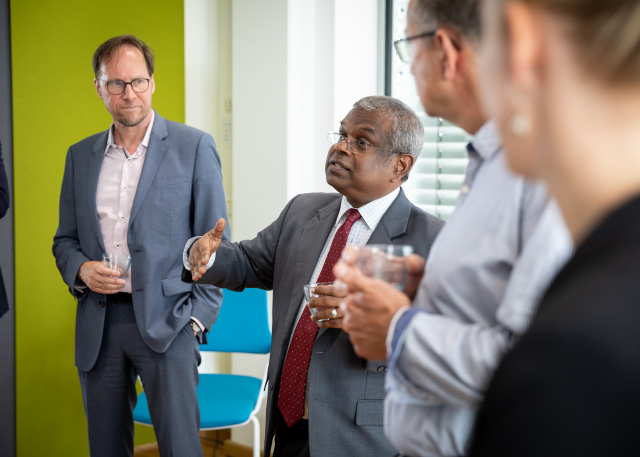21/07/2022 | In the context of this year’s ICRS, Dr. Abdulla Naseer, Minister of State in the Ministry for Environment, Climate Change and Technology of the Republic of Maldives, visited the Leibniz Centre for Tropical Marine Research (ZMT) in Bremen for an informal exchange on 5th July 2022. Scientists at ZMT and Dr. Naseer took the opportunity to discuss relevant marine issues for the island nation and upcoming challenges.
After extending a warm welcome, Prof. Dr. Bleischwitz, Scientific Director of ZMT, gave a brief introduction to the history of the institute and some of the current multidisciplinary research topics. He highlighted this visit as a great opportunity of mutual listening and learning.
Dr. Naseer, who wrote his PhD on coral reef formation, stressed that the Maldives are most vulnerable to climate change and that for a coral-dependent nation there is no life without corals. With this powerful statement, Dr. Naseer gave the participants an overview of some of the most pressing issues the island nation is facing – such as sea level rise, freshwater supply, waste treatment, protection and restoration work, or scattered management issues.
According to Dr. Naseer, the situation in the Maldives is complex. About 14 - 15 % of the Maldives’ ~4,500 km2 reef area is protected. In numbers, there are 79 MPAs, but only 9 have a management plan. Although the MPA procedure in the Maldives is very strict, enforcement is not easy. Dr. Naseer stressed that the government cannot controll all of them, e.g. for the simple reason that there are not enough rangers to patrol all the islands.
Awareness of the precious environment in everyday life also needs to grow. For example, many of the resorts remove seagrass in the shallow lagoon areas surrounding them, as they perceive the seagrass washing up on the beaches as unsightly - the many benefits of seagrass are not widely known. Natural disasters like a great mangrove die-off in 2021 or two major coral bleaching events in 2016 and 1998 challenge the island nation, as recovery takes decades.
Dr. Naseer also emphasized the positive developments over the past years and the many opportunities that result from international cooperations. For example, during regular monitoring programmes, researchers and managers could observe how the reefs fully recovered from the first to the second bleaching, and that the composition of the reefs has changed. The ministry was able to gather data and thus document these processes.
Also, reef restoration activities such as coral farming and coral gardening are helpful tools to mitigate reef degradation, but require additional research in order to be based on sound knowledge. Most resort islands have their own diving centers and participate in such activities. The cleaning of some landfills on the islands is also planned for the near future. Ever stronger cooperation with local stakeholders and new concepts for other effective area-based conservation measures (OECMs) can be potential solutions.
The thematic presentations by the ZMT scientists related to the topics addresses by Dr. Naseer. Prof. Dr. Marie Fujitani spoke about sustainable tourism and tourism-induced impacts on coral reefs, and how future tourism can contribute to the well-being of residents and tourism assets. Dr. Hauke Reuter presented his work on agent-based modeling of coral reef dynamics, assessing the effects of mechanical disturbances or heat waves on corals in the Indian Ocean.
Dr. Kay Davis presented how groundwater leakage can smother coral reefs or affect their development, and how proper freshwater management can mitigate such risks. Dr. Tim Jennerjahn spoke about the chances of Blue Carbon and how the value of associated ecosystem services can be assessed. Dr. Andreas Kunzmann presented work supporting the Pulau Pieh MPA in western Indonesia as an example of how collaboration between institutions and stakeholders can lead to success. The discussions that followed provided great opportunity to identify common grounds for future collaboration in research and capacity development.





